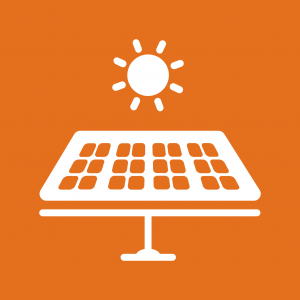We need to end displacement and ensure dignified housing and access to affordable, efficient and clean energy for Providence residents, while eliminating fossil fuel use in all buildings.
Buildings account for 70% of the city’s carbon footprint. Ensuring they are made to be more energy efficient and transitioned off of fossil fuels (including natural gas, which is the primary source of heating the Providence) is critical to meeting our climate goals. Providence is experiencing a boom in development but the effects of these projects and improvements are not felt evenly across the city. Striking a balance between progress and equity is required for a truly inclusive community where all residents have access to jobs, housing, and a good quality of life.
How Will We Get There?
Targets
By 2035: 48% of residential heating and 45% of commercial converted to heat pumps.
By 2050: 90% of residential heating and 85 percent of commercial converted to heat pumps.
By 2040, reduce low-income energy burden to <5% (low income energy burden is the percent of income that low-income households are spending on energy).
By 2040, eliminate utility shut offs.
By 2030, 100% of municipal buildings’ electricity will be renewable.
By 2040, 100% of municipal buildings’ heating will be renewable.
Targets to Develop
Increase the energy savings (MMBTUs) for low income households in Providence.
Increase low-income energy efficiency program participation.
Increase energy efficiency and electrification investment dollars for low income households.
Housing and anti-displacement metrics and targets.
Strategies
Ensure all residents can benefit from energy efficiency improvements without concern for being displaced.
Stop the displacement of communities of color in Providence.
Initiate Community Benefit Agreements for large projects
Explore mechanisms to prioritize affordable housing for displaced populations.
Pass a Building Energy Reporting Ordinance (BERO).
Explore mandatory emissions reductions for large buildings.
Require homes and small buildings to disclose their energy performance at the time of rental or sale.
Advocate for the state of Rhode Island to adopt more advanced energy code standards.
Expand knowledge of and access to existing energy efficiency programs.
Expand energy efficiency, energy access, clean energy and electrification programs to better serve low-income communities, renters, and other underserved populations.
Identify additional funding for energy efficiency investments in frontline communities.
Create more equitable energy rate structures.
 Make Your Home or Building Energy Efficient
Make Your Home or Building Energy Efficient
Rhode Island has set policies that require utilities to invest in energy efficiency as a fuel source, rather than buy more traditional energy like fossil fuels. This is because a one-time investment in a building’s energy efficiency is much more cost effective than buying more energy year over year. These investments also provide local jobs and keep our building stock in good shape.
Do you manage or own large buildings in Providence? Check out RePowerPVD, the City of Providence’s voluntary energy challenge program, designed to help large buildings in the city conserve energy, save money, and gain recognition for their leadership and contributions to Mayor Elorza’s goal to make Providence carbon neutral by 2050.
No Cost Home Energy Assessment Air Source Heat Pumps RePowerPVD Rhode Island Energy Assistance Programs
 Go Solar
Go Solar
By investing in solar energy, you can save money on your electricity bills, take advantage of federal tax credits and incentives for solar, and increase the value of your home. Creating a demand for solar also helps support the local clean energy economy by creating local jobs.

